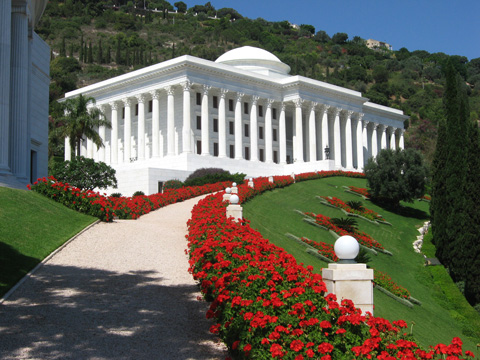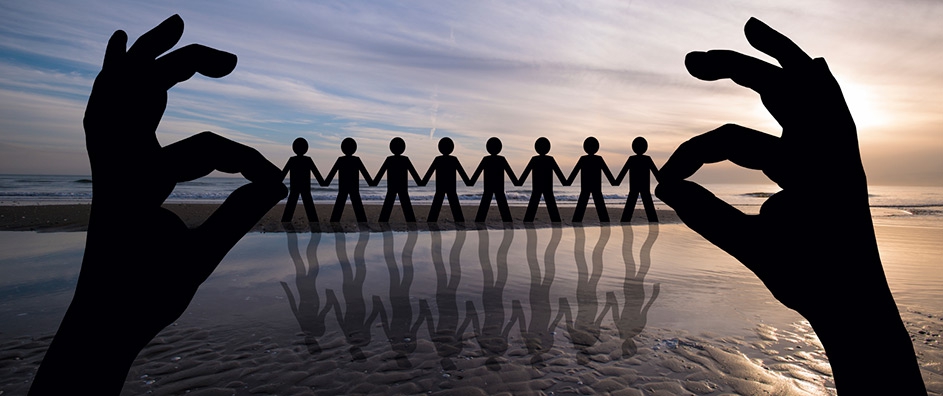The views expressed in our content reflect individual perspectives and do not represent the authoritative views of the Baha'i Faith.
Because Baha’u’llah intended the Baha’i teachings for the construction of a single all-encompassing world civilization, they belong to humanity as a whole—not just to the Baha’is.
Everyone can make an effort to put those teachings of love, peace, unity and global harmony into practice. Preserving common ownership of the Baha’i Faith requires empowering the broadest possible base of people to contribute with their hands, hearts, and minds to the realization of Baha’u’llah’s vision.
The Baha’i teachings, then, constitute a global commons. This means that just like the sky, the oceans, the internet, or the writings of ancient authors, they cannot become the private possession of any one individual or group. Genuinely belonging to no one in particular, the body of Baha’u’llah’s teachings belongs to everyone. Genuinely belonging to everyone, no individual can claim on their own authority that their interpretation is right and others should be excluded.
Instead, the Baha’i teachings promote cooperation, mutual sharing of insights, and open channels of interaction unimpeded by sectarian divisions. In one place in his writings, Baha’u’llah observes that the opposite of such an approach diminishes the vitality and strength of religion:
In these days it is incumbent upon everyone to adhere tenaciously unto unity and concord and to labour diligently in promoting the Cause of God, that perchance the wayward souls may attain that which will lead unto abiding prosperity. In brief, dissensions among various sects have opened the way to weakness. Each sect hath picked out a way for itself and is clinging to a certain cord. – Tablets of Baha’u’llah, pp. 59-60.

Seat of the Baha’i Universal House of Justice
Common ownership of the Baha’i teachings requires cohesion and unity between participants in the civilization-building process envisioned by Baha’u’llah. This is one reason that Baha’u’llah taught all his followers to turn to his son Abdu’l-Baha as the sole authoritative interpreter of his words after his death, and why he called for the global, democratic election of a governing council, the Universal House of Justice, that would make decisions and give instructions on issues not covered in his writings. This covenant Baha’u’llah made with his followers gives Baha’is a single point they can turn to for guidance. The unity of Baha’u’llah’s followers—much more than just an idea or a principle—has become a way of operating, woven deeply into the fabric of Baha’i practice.
Even though the Baha’i teachings belong to nobody in particular, they nonetheless designate structures of governance with the authority to speak and act on behalf of the Baha’i Faith as a whole. Today, the Universal House of Justice performs this role. But in this context authority doesn’t mean top-down domination. Those who serve at the grassroots aren’t just foot soldiers. The Universal House of Justice exercises its authority in the way Baha’u’llah meant it to: a way that enables individuals at the grassroots to contribute actively to the evolution of Baha’i practice. As more and more of the world’s people contribute actively to that process, the more we can assume the responsibilities that come with common ownership of Baha’u’llah’s message.
One of the most important ways the Universal House of Justice helps people do this is by overseeing multi-year global plans of action. At the moment, there is a Five Year Plan stretching from 2011 to 2016. Since 1996, a series of plans has organized an expanding web of community life around a framework for action based on three avenues of personal development: 1) classes for the spiritual education of children, 2) a program for the spiritual empowerment of early adolescents, and 3) the engine powering these endeavors; systematic study of the Baha’i writings aimed at raising capacity for performing acts of service. This educational process has helped foster a pattern of community life characterized by fellowship, worship, and mutual assistance. Most of the individuals involved in this process are Baha’is– but many others who don’t think of themselves as Baha’is also get involved, motivated by many of the same social and spiritual aspirations. They feel inspired by the Baha’i focus on the education and empowerment of children and youth, and for that reason feel a sense of ownership for the progress of their neighborhoods and communities.
In 2008, the Universal House of Justice wrote about the benefits of this systematic approach to community activity:
Communities everywhere are gradually internalizing the lessons being learned from systematization, and the framework defined by the current series of Plans lends consistency and flexibility to the endeavours of the friends. Far from restricting them, this framework enables them to seize opportunities, to build relationships, and to translate into reality a vision of systematic growth. In a word, it gives shape to their collective powers. – The Universal House of Justice
Crafted with care and thoughtfulness, a common framework for action around a set of service-oriented goals can serve as a template for individual and collective empowerment. This field of service to the Earth’s next generations has inspired a growing body of active contributors and participants. As it swells and deepens, a sense of common ownership for Baha’u’llah’s teachings takes root in the world.
















Comments
Sign in or create an account
Continue with Googleor